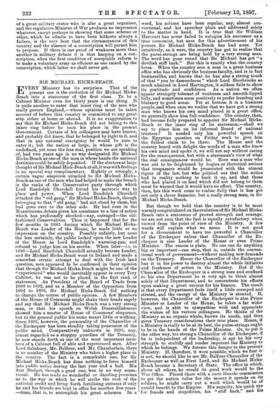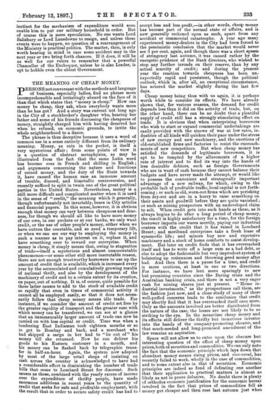SIR MICHAEL HICKS-BEACH.
destinies could be safely deposited. If the electors at large thought of Sir Michael Hick-Beach at all, it was with feelings in no special way complimentary. Rightly or wrongly, a certain vague suspicion attached to Sir Michael Hicks- Beach as one of the men who had helped to make the breach in the ranks of the Conservative party through which Lord Randolph Churchill forced his meteoric way to place and power. When Lord Randolph Churchill attacked the "old gang," Sir Michael Hicks-Beach, though belonging to that "old gang," had not stood by them, but had gone over to the other side. He had even in the Maaintrasma debate given his assistance to a line of action which has profoundly shocked—nay, outraged—the old- fashioned Conservatives. Thus it happened that for the few months in 1885 during which Sir Michael Hicks- Beach was Leader of the House, he made little or no impression on the country. Possibly unfairly, but none the less certainly, the public looked upon the new Leader of the House as Lord Randolph's warming-pan, and refused to judge him on his merits. When later—i.e, in 1886—Lord Randolph Churchill actually became Leader, and Sir Michael Hicks-Beach went to Ireland and made a somewhat erratic attempt to deal with the Irish land question, men appeared to be confirmed in their opinion that though Sir Michael Hicks-Beach might be one of the "experienced" who would inevitably appear in every Tory Cabinet, he was not to be placed in the first rank of statesmen. As President of the Board of Trade from 1888 to 1892, and as a Member of the Opposition from 1892 to 1895, Sir Michael Hicks-Beach did nothing to change the course of public opinion. A few Members of the House of Commons might shake their heads sagely and say that Sir Michael Hicks-Beach was a very strong man, or that his speech on Welsh Disestablishment showed him a master of House of Commons' eloquence, but to the general public his name meant little or nothing. Since 1895, however, the personality of the Chancellor of the Exchequer has been steadily taking possession of the public mind. Comparatively unknown in 1895, nay, almost regarded as a stopgap guardian of the Treasury, he now stands forth as one of the most important mem- bers of a Cabinet full of able and experienced men. After Lord Salisbury, Mr. Balfour, and Mr. Chamberlain, there is no member of the Ministry who takes a higher place in the country. The fact is a remarkable one, for Sir Michael Hicks-Beach has done nothing to force himself into public notice during the last year and a half. His first Budget, though a good one, was in no way sensa- tional. He has made no wonderful or dazzling promises as to the way in which he will strike the rock of the national credit and bring forth fertilising streams if only he and his friends are kept in office for another five years —time, that is, to accomplish his great schemes. In a word, his actions have been regular, nay, almost con- ventional, and his speeches plain and addressed solely to the matter in hand. It is true that Sir William Harcourt has never failed to eulogise his successor as a true economist, but save for this advertisement of his powers Sir Michael Hicks-Beach has had none. Yet intuitively, as it were, the country has got to realise that the purse-strings are being held by a very strong man. The word has gone round that Sir Michael has got "a devilish stiff back." But this is exactly what the country loves. When the country sees a man in a great business office who has obviously the business faculty, and is in fact businesslike, and knows that he has also a strong touch of that "you be damnedness " which Lord Sherbrooke so much admired in Lord Hartington, it seldom fails to show its gratitude and confidence. As a nation we often appear strangely tolerant of weakness and smooth-lipped folly, and sometimes seem positively to prefer humbug and blatancy to good sense. Yet at bottom it is a business people, and when once we realise that we have got a strong man who knows his own mind placed in a great office, we generally show him full confidence. The country, then, had become fully prepared to appoint Sir Michael Hicks- Beach to the inner ring of its statesmen,—shall we say to place him on its informal Board of national trustees ? It needed only his powerful speech on the Egyptian question on Friday week to give him the fullest claim to be there. The House and the country heard with delight the words of a man who knew his own mind and spoke it, we will not say without caring for the consequences, but with a statesman's view of what the real consequences would be. Here was a man who was not to be frightened by bogies or rhetorical notices that trespassers would be prosecuted with the utmost rigour of the law, but who pointed out that the notice had in reality nothing to back it up, and that those who had placed it on land which did not belong to them must be warned that it would have no effect. The country, then, has this week come to realise fully that it has got not only a clever financier, but a really strong man, in Sir Michael Hicks-Beach.
But though we hold that the country is to be most warmly congratulated on the evolution of Sir Michael Hicks- Beach into a statesman of proved strength and courage, we are not sure that the fact is equally satisfactory when viewed from the point of view of the Ministry. A few words will explain what we mean. It is not good for a Government to have too powerful a Chancellor of the Exchequer unless that Chancellor of the Ex- chequer is also Leader of the House or even Prime Minister. The reason is plain. No one can do anything big or important—can step, that is, outside the conven- tional work of government—without making new demands on the Treasury. Hence the Chancellor of the Exchequer has it in his power to destroy almost the whole initiative and freshness of action in the Ministry. But if the Chancellor of the Exchequer is a strong man and confined to his own Department he is very apt to think almost solely of that Department, and to concentrate his efforts upon making a great success for his finance. The result is that every Department feels itself a little cramped and stinted, and the energy of the Ministry is stunted. If, however, the Chancellor of the Exchequer is also Prime Minister or Leader of the House, he takes a far wider view, and is able to sympathise with and appreciate the wishes of his various colleagues. He thinks of the Ministry as an organic whole, knows its needs, and thus gives Treasury considerations their true place. Hence, if a Ministry is really to be at its best, the purse-strings ought to be in the hands of the Prime Minister. Or, to put it the other way, too strong a Chancellor of the Exchequer, if he is independent of the leadership, is apt by his very strength to stultify and render impotent the Ministry to which he belongs. We foresee this danger to the present Ministry. If, therefore, it were possible, which we fear it is not, we should like to see Mr. Balfour Chancellor of the Exchequer as well as First Lord, and Sir Michael Hicks- Beach become a Secretary of State. The office in which, above all others, he would do good work would be the War Office. Placed there with a carte blanche commission to get the nation value for the money it spends on its soldiers, he might carry out a work which would be of untold benefit to the Empire. His sagacity, his quick eye f•)r. frauds and stupidities, his "stiff back," and his instinct for the mechanism of expenditure would 80011 enable him to put our military household in order. But of course this is mere speculation. No one wants Lord Salisbury or Lord Lansdowne to resign, and unless these events were to happen, no question of a rearrangement of the Ministry is practical politics. The matter, then, is only worth bearing in mind in case some accident may in the next year or two bring forth chances. If it does, it will be as well for our rulers to remember that a powerful Chancellor of the Exchequer, unless he is also Leader, is apt to hobble even the ablest Government.



































 Previous page
Previous page